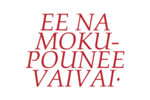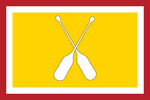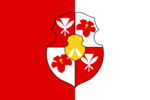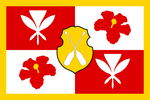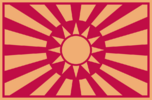Flag of Konalani
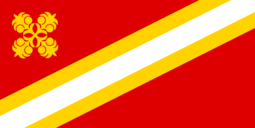 | |
| Name | Konalanese: Ka hae o Konalani Oharic: Yekonalanī Banidīra |
|---|---|
| Use | National flag and ensign |
| Proportion | 1:2 |
| Adopted | January 1, 1864 |
| Design | A red field with a gold kāhili in the canton and a gold-fimbriated white diagonal band from the lower hoist-side to the upper fly-side. |
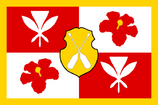 Variant flag of Konalani | |
| Name | Konalanese: Ka hae aliʻi Oharic: Yenigusawī Banidīra |
| Use | Royal standard |
| Proportion | 2:3 |
| Adopted | March 24, 1836 |
| Design | Banner of arms of Konalani surrounded by a golden border. |
The flag of Konalani (Konalanese: Ka hae o Konalani; Oharic: Yekonalanī Banidīra) is the national flag of the Kingdom of Konalani, and consists of a red field with a gold kāhili, a symbol of Native Konalanese authority, in the canton, with a gold-fimbriated white diagonal band stretching from the lower hoist-side to the upper fly-side. First adopted in 1864, the Konalanese flag has become a strong national symbol for both Konalani as a state and the indigenous Native Konalanese.
The colours of red and gold have traditionally been used by the aliʻi, the indigenous nobility, to denote royalty and authority. As such, these colours have been used since the early 19th century to symbolize the Konalanese state and its monarchy. The flag has been redesigned four times since Konalani's formal recognition of independence in 1822. The royal standard of Konalani, used by the royal family at their residences and at official ceremonies, is a banner of arms of the coat of arms of Konalani surrounded by a golden border, and was officially adopted in 1836.
Design
The design of the Konalanese flag consists of a red field, with a white diagonal band with a gold border stretching from the lower-left corner of the flag to its upper-right. In the canton is a kāhili, a symbol of the Konalanese monarchy. The flag's proportions were officially set as 1:2 in 1948, although unofficial flags with 2:3 proportions are still commonly seen on the islands. The flag's colours were standardized according to Pantone, CMYK, and RGB values through the passing of the National Symbols Standardization Act of 2005. In 2013, this law was amended to include imagery of the flag on the Internet, adding hexadecimal values.
| Colours | Red | White | Gold |
|---|---|---|---|
| Pantone | 185 C | 656 C | 7405 C |
| CMYK | 0-100-100-13 | 0-0-0-0 | 0-17-100-0 |
| RGB | 222-0-0 | 255-255-255 | 255-211-0 |
| Hexadecimal | #DE0000 | #FFFFFF | #FFD300 |
History
Konalani's first unofficial flag was adopted two years after the Treaty of the Paddles, securing the country's sovereignty as a unified state under ʻIolani I. This flag, adopted in 1824, featured the Konalanese phrase ee na mokupounee vaivai ("to the rich/bountiful islands", in modern orthography now written as i na mokupuni waiwai) embroidered in red on a white field. By 1827, a new flag more closely associated with ʻIolani I was used, featuring his symbol of two crossed white oars on a golden field, surrounded by a red and white border. Both of these flags were used as royal standards more than modern-day national flags.
With the accession of ʻIolani II to the Crown in 1835, the new king standardized the use of flags as symbols of the Konalanese state, adopting both a new state flag, consisting of the new coat of arms on a bisected field of red and white, and a royal standard, a banner of arms surrounded by a golden border. These flags became the first official designs to represent Konalani and its government in diplomatic missions and abroad. The royal standard remains in use by the royal family to this day.
In 1863, three years after the signing of Konalani's first constitution, the Parliament passed the National Symbols Act, adopting a new national flag that was intended to be separate from the monarchy. This flag has continuously acted as the national flag and ensign for Konalani since its official adoption on 1 January 1864, with only the islands' occupation during the Thalassan War by Mat Troi Lan between 1942 and 1947 seeing the flag become banned and removed from government and administrative buildings by the military administration.
Konalanese republicans often use a version of the flag that removes the kāhili due to its association with the monarchy, leaving the canton blank or occasionally replacing the kāhili with a five-pointed star. These variants are seen at pro-republican protests, rallies, and within pro-republican political movements and parties.
First attested flag used by ʻIolani I (1824–1827)
First official flag adopted by ʻIolani II (1836–1864)
Flag of Mat Troi Lan, used during occupation (1942–1947)
Subnational flags
Since 1949, the five islands that make up the Konalanese archipelago have adopted flags to represent their local governments and communities.
